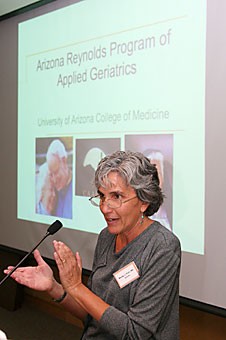The UA College of Medicine was recently awarded a prestigious $1.9 million grant, which it will use to revamp its curriculum to include specialized geriatrics education.
The money will be used to create the Arizona Reynolds Program of Applied Geriatrics, which will equip medical students, residents and physicians with the knowledge necessary to care for the increasing number of elderly patients in America.
Surgeons, oncologists, department heads and other specialists met yesterday to discuss integrating the program into the educational process.
“”This is the beginning of an exciting and ambitious program,”” said Dr. Mindy Fain, director of the ARPAG, who played an important part in securing the grant.
Fain said that the ARPAG is based on a four-pronged approach to educate undergraduates, graduates, faculty and practicing physicians.
The program will be implemented on both the Tucson and Phoenix campuses of the UA College of Medicine.
Dr. Keith Joiner, dean of the UA College of Medicine, said he believes this will transform education in geriatrics, an increasingly important area of health care.
“”What’s really great about the structure (of the program) is how many disciplines are involved,”” said Joiner, who was also instrumental in coordinating the grant with the Reynolds Foundation.
Dr. Jim Warneke, an associate professor of surgery who is also in charge of curriculum development, said the program will equip health care providers to be “”much more able to take care of patients and anticipate problems.””
The curriculum will consist of hands-on clinical rounds, case studies, web-based modules and mentoring from specially appointed Reynolds Scholars, Warneke said.
Dr. Joseph Alpert, editor in chief of the American Journal of Medicine and former UA Department of Medicine head, said training in geriatrics is especially important because the fastest growing segment of the population is people of retirement age.
“”Twenty-five years ago, it was rare to perform certain types of surgery on patients over 75,”” Alpert said.
Dr. Steven Barker, head of the anesthesiology department, said even open-heart surgery has become commonplace on patients who are over 75.
Fain said a combination of the shifting demographic, new technology and procurement of the grant will provide for a successful program.
“”This was basically the right approach at the right time with the right people,”” Joiner said.
Dr. Harvey Meislin, a Reynolds Scholar and director of emergency services, said he hopes to develop a database that would coordinate education for patients’ prescriptions, which would solve disparities in the current system.
At present, it is difficult for doctors and patients alike to keep track of how many and what types of medications patients are taking, he said.
Dr. Leona Downey, head of the gero-oncology program, is excited for the advances that the program will bring to her area of expertise.
“”A major problem with cancer in elderly patients is that cancer biology is different for older people; it affects them differently,”” said Downey, who said the ARPAG will result in better treatment of baby boomers’ ailments.
Fain said that the ARPAG will involve collaboration of numerous medical school departments as well as outside organizations.
“”(The grant) will build interest in the programs in general here and hopefully bring in more grants,”” said Dr. Tamsen Bassford, department head of family and community medicine.
The grant was appointed by the Donald W. Reynolds Foundation, one of the largest private foundations in the U.S.
The UA is among a select group of 10 academic health centers in the nation to receive the Reynolds grant, in the “”third cohort,”” or round, of grant appointments awarded since 2001.
The grant is part of the Reynolds Foundation’s Aging and Quality of Life program, which aims to fund education on dealing with specific physical and psychosocial conditions that frail, elderly people suffer from.
The foundation was established in 1954 after its namesake, a media entrepreneur and philanthropist.
Duke University, Yale University and Stanford University were among the academic institutions awarded grants in 2005.









